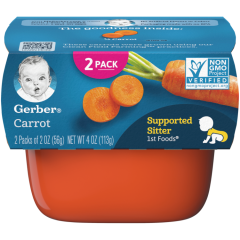Keeping Soil in the Family
Some soil can have naturally high levels of nitrates and heavy metals, which you don’t want in your baby’s food. That’s why we created requirements for growing our fruits and veggies that are among the strictest in the world.
The Karnemaats have been working their farm in Michigan, perfecting techniques that maintain Gerber’s high soil standards, for generations. To say quality control runs in the family would be an understatement. Dan Gerber, the founder of Gerber, used to walk the fields with great-grandfather Karnemaat. So they know that when it comes to soil, what you get out is what you put in.
Farming know-how is a family heirloom, passed between generations as long as there is land to be tilled. Lessons learned from the bountiful years — and the lean ones, too — are noted and tucked away in a place never too far from reach. It holds true for all growers, everywhere, that the better you know the land, the more it gives to you.


Brothers Kent and Tom Karnemaat, and their children, are as rooted in the sandy tracts of dirt near Fremont, Michigan, as the carrots, squash and peas they grow there. Tracing back to their great great grandfather, Albert, who planted this farming family tree in the 1800s, the Karnemaats who now work the land, have leaned on and learned from past generations.


Their soil is rich and fertile. And when Gerber puts the produce harvested on Karnemaat land into its baby foods, it is full of nutrition and wholly delicious. Those are the hallmarks of foods that are raised in healthy soil, and why Gerber has such strict soil standards.
Putting soil first
A farmer’s relationship with his soil is that of a trusted business partner. Each side relies on the other for its well being and, when treated properly, both are rewarded. If soil is neglected, the relationship can go astray. Poor soil will yield food deficient in nutrients that spoils quickly. Growing produce for baby food in soil that is rigorously tested is a cornerstone of the relationship between Gerber and the Karnemaats.


For the most part, what makes great soil, Karnemaat says, is good decisions. That comes with lessons learned through generations, an openness to developing creative solutions — often with the help of Gerber’s Agriculture Team — and a willingness to put soil health over profit.
In order to draw out the nutrients left in the ground by the carrot crop, for instance, the Karnemaats plant winter wheat, a crop that won't be harvested. Its sole purpose is to replenish the soil by drawing out nutrients left behind by the carrots and returning them to the ground come spring when the wheat is cut down and left in the field.


New generations, new ideas
The forefathers of Karnemaat Farms didn’t even irrigate the fields, let alone envision how technology would shape the time-honored craft of farming. But each generation brings its own new insights — and solutions.
The next wave of innovation has already begun. Kent’s son, Trent, has helped lead a push towards precision farming. By mapping the farm using GPS technology, all 3,200 acres of soil can now be regulated and monitored more closely than ever before. It’s another way in which the Karnemaats are reinvesting in the land.


Not long ago, the new generation of Karnemaats were toddling around the fields they’re now tending. Even as methods change with the times, they haven’t lost touch with the conviction that when growing for babies one value remains steady: It all starts with soil.
Featured in this Story
Food
Carrots |
Feature product
 |
1st Foods® Carrot |
Farms


|
Karnemaat Farms Fremont, Michigan |
Experts
 |
Kent KarnemaatGerber Grower |
 |
Trent KarnemaatGerber Grower |

